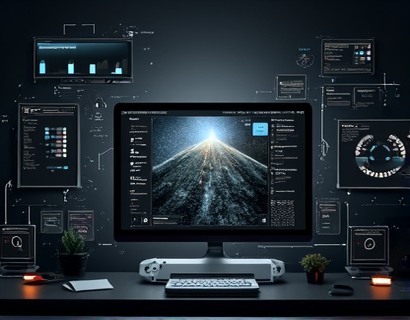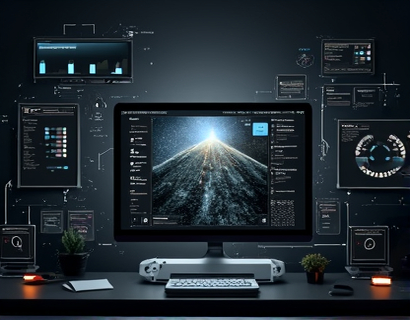AI-Powered Life Management: Transforming Decision-Making and Boosting Productivity
In the fast-paced world of today, managing personal and professional life efficiently is more crucial than ever. The integration of Artificial Intelligence (AI) into life management tools offers a revolutionary approach to simplifying decision-making and enhancing productivity. An AI-powered personal assistant serves as a sophisticated tool, providing intelligent insights and tailored guidance to streamline daily tasks and navigate life's complexities. This advanced technology not only simplifies routine activities but also empowers individuals to achieve their goals with greater ease and effectiveness.
The core functionality of an AI-driven personal assistant lies in its ability to understand and learn from user behavior and preferences. By analyzing patterns and data, the AI can offer personalized recommendations and solutions that align with the user's objectives. This level of customization ensures that the insights and guidance provided are relevant and actionable, making it an invaluable companion in both personal and professional spheres.
Intelligent Insights for Informed Decisions
One of the most significant benefits of an AI-powered life management tool is its capacity to provide intelligent insights. These insights are derived from a combination of data analysis, predictive modeling, and machine learning algorithms. By processing vast amounts of information, the AI can identify trends, predict outcomes, and suggest optimal courses of action. This capability is particularly useful in complex decision-making scenarios where human judgment alone might be insufficient or biased.
For instance, when faced with a major career decision, an AI assistant can analyze market trends, job market demands, and personal career history to recommend the best path forward. It can also consider factors such as work-life balance, financial stability, and long-term growth opportunities, providing a comprehensive view that enhances the quality of the decision. This level of insight not only saves time but also reduces the stress associated with making important choices.
Enhancing Productivity Through Task Management
Productivity is often hindered by disorganization and poor time management. An AI-powered personal assistant addresses these issues by offering advanced task management features. The AI can prioritize tasks based on urgency, importance, and personal preferences, ensuring that the most critical activities are addressed first. It can also break down large projects into manageable steps, set deadlines, and remind users of upcoming tasks, helping to maintain a structured and focused workflow.
Moreover, the AI can learn from the user's habits and preferences to optimize task scheduling. For example, it might recognize that a user is more productive in the morning and schedule critical tasks during this time. By adapting to the user's rhythms, the AI enhances overall efficiency and ensures that time is used effectively.
Seamless Integration and User Experience
The effectiveness of an AI-powered life management tool is greatly enhanced by its seamless integration into the user's daily routine. A well-designed interface ensures that interactions with the AI are intuitive and user-friendly, minimizing the learning curve and maximizing usability. Whether accessed through a mobile app, desktop software, or voice commands, the tool should fit effortlessly into the user's lifestyle.
Voice integration, in particular, offers a hands-free approach to managing tasks and accessing information. This is especially beneficial in situations where manual input is inconvenient or impractical. The AI can handle queries, provide updates, and execute commands through natural language processing, making the experience smooth and natural.
Personalized Goal Setting and Achievement
Setting and achieving goals is a fundamental aspect of personal and professional growth. An AI-powered personal assistant can play a pivotal role in this process by helping users define clear, achievable goals and providing strategies to reach them. The AI can guide users through the SMART (Specific, Measurable, Achievable, Relevant, Time-bound) goal-setting framework, ensuring that objectives are well-defined and actionable.
Once goals are set, the AI can monitor progress, offer motivational prompts, and adjust strategies as needed. It can also identify potential obstacles and suggest proactive measures to overcome them. This continuous support system helps users stay on track and maintain momentum, increasing the likelihood of success.
Health and Well-being Integration
Recognizing the importance of mental and physical health in overall productivity, an AI-powered life management tool can integrate health and well-being features. The AI can track fitness goals, monitor sleep patterns, and provide recommendations for stress reduction and relaxation techniques. By promoting a balanced lifestyle, the AI contributes to sustained energy levels and improved focus, further enhancing productivity.
For example, if the AI detects a pattern of poor sleep quality, it can suggest adjustments to the user's bedtime routine or recommend relaxation exercises. It can also integrate with wearable devices to monitor heart rate, activity levels, and other health metrics, offering a holistic view of the user's well-being.
Building Habits and Routines
Habits and routines are the building blocks of a productive life. An AI-powered personal assistant can assist in establishing and maintaining positive habits while breaking negative ones. By analyzing the user's behavior and preferences, the AI can identify opportunities for habit formation and provide tailored strategies.
For instance, if a user aims to start a daily meditation practice, the AI can set reminders, track progress, and offer encouragement. It can also identify triggers that disrupt the habit and suggest ways to overcome these challenges. Over time, the AI helps reinforce positive behaviors, leading to lasting changes in the user's daily routine.
Collaboration and Communication Enhancement
In a professional setting, effective collaboration and communication are key to success. An AI-powered life management tool can enhance these aspects by streamlining communication channels and facilitating team coordination. The AI can manage calendars, schedule meetings, and send reminders, ensuring that all team members are on the same page.
Additionally, the AI can assist in document management, suggesting templates, and automating routine tasks such as data entry. It can also provide real-time insights into project progress, helping managers make informed decisions and adjust strategies as needed. This level of support not only improves efficiency but also fosters a more collaborative and productive work environment.
Continuous Learning and Adaptation
One of the most advanced features of an AI-powered personal assistant is its ability to continuously learn and adapt. Through machine learning algorithms, the AI refines its understanding of the user's preferences and behavior over time, becoming more accurate and effective in its recommendations. This continuous improvement ensures that the tool remains a relevant and valuable resource, evolving alongside the user's needs and goals.
For example, if a user frequently seeks advice on time management, the AI will increasingly focus on providing insights and strategies related to this area. It can also introduce new features and functionalities that align with the user's evolving requirements, keeping the tool at the forefront of personal and professional development.
Privacy and Security Considerations
While the benefits of an AI-powered life management tool are significant, privacy and security remain paramount concerns. Reputable AI solutions prioritize user data protection, implementing robust encryption and secure storage practices. Users should have control over their data, including the ability to delete information and manage privacy settings. Transparency in data usage and clear privacy policies are essential to building trust and ensuring that users feel secure in using the tool.
It is also important for the AI to comply with relevant data protection regulations, such as the General Data Protection Regulation (GDPR) in the European Union. By adhering to these standards, the tool not only safeguards user information but also demonstrates a commitment to ethical practices.
Conclusion
AI-powered life management tools represent a significant leap forward in personal and professional productivity. By providing intelligent insights, enhancing task management, and promoting healthy habits, these tools help individuals simplify decision-making and achieve their goals with greater ease. As technology continues to evolve, the potential for AI to transform daily life becomes increasingly promising. Embracing these advanced solutions can lead to a more organized, efficient, and fulfilling existence, enabling users to reach their full potential in both personal and professional realms.










































